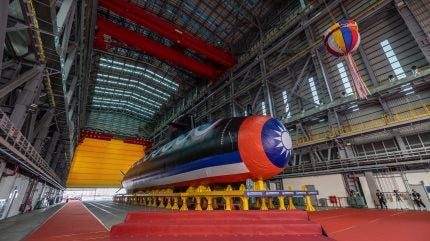
Taiwan is making a move to bolster its naval capabilities with an $8.8bn (T$280.7bn) investment in its Indigenous Defence Submarine Programme (IDSP), aiming to integrate eight submarines into its fleet over the next decade.
According to GlobalData, a leading data and analytics company, this initiative is seen as an element in Taiwan’s strategy to counter China’s growing military pressure.
Taiwan’s commitment to enhancing its submarine fleet directly responds to the intensifying regional dynamics and ongoing territorial disputes with China.
China is also deploying a more advanced version of SSBNs, namely the Tang-class (Type 096), to enhance its submarine-based deterrence capabilities, as highlighted by GlobalData’s intelligence on the global submarine market.
The IDSP, which will introduce eight new submarines over the next decade, represents a step in Taiwan’s defence strategy. This investment, detailed in GlobalData’s latest report, “The Global Submarine Market Forecast 2024-2034,” highlights a forecasted compound annual growth rate (CAGR) of over 5% in Taiwan’s submarine procurement spending.
Rithik Rao, aerospace & defence analyst at GlobalData, sheds light on Taiwan’s pivot: “Taiwan faced several hinderances while attempting to import new submarines due to diplomatic curbs from China. However, within the last decade, it has been able to gain the required technical expertise and establish the necessary supply chain to facilitate the indigenous construction of modern diesel-electric submarines.”
In September 2023, Taiwan launched the country’s first domestically made submarine, a Hai Jun-class diesel-electric submarine. The new Hai Kun-class submarines are expected to be around 260 feet long and weigh between 2,460 and 2,950 tons, as highlighted by GlobalData’s “Taiwan Defense Market 2024-2029” report.
The forthcoming Hai Kun-class submarines will incorporate a wealth of technologies, including combat management systems, electro-optical masts, sonars, MK-48 Mod6 torpedoes, and UGM-84 Harpoon missiles, much of which comes from US suppliers.
The US has approved arms sales to Taiwan, including the Switchblade 300 loitering munitions as part of a strategy to bolster Taiwan’s defences amid rising tensions with China. In response, China has strongly condemned these sales, citing them as violations of the One-China Principle, and has suspended arms control talks with the US.
Despite its importance, the IDSP has faced domestic criticism. Issues such as the programme’s high cost, slow development progress, and the decision to plan additional units before the initial submarine has completed sea trials have been points of contention within Taiwan.
Rao adds, “While much of the programme’s details have not been publicly revealed, the relevance of a modern submarine in the naval fleet is well understood by Taiwanese policymakers, given the asymmetric advantage a submarine provides in naval warfare. It is likely to come off as a valuable investment in the country’s efforts to maintain its sovereignty.”







